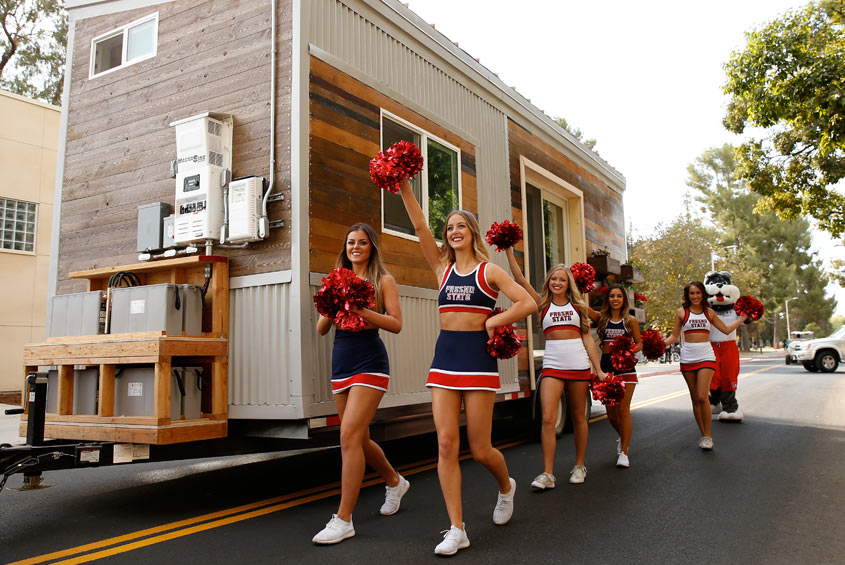Tiny House, Big Responsibility
Construction management students gain exposure to sustainable practices that benefit the whole region
by Rebecca Wass
It’s Saturday morning and student Thomas Dailey is perched on the soon-to-be roof of the 190-square-foot tiny home he’s helping to build. The sound of hammer on nail is echoing across the quiet Fresno State campus this sun-scorched August morning. Sweat slides down both Dailey’s cheeks as the clock strikes noon. He puts the hammer back in his tool belt and climbs down the ladder — only to pack up and start again the next day.
It’s hard work and an extra time commitment, but it’s also a hands-on learning opportunity that provides Dailey valuable experience for when he enters the job market. By offering sustainable research and learning opportunities such as the Tiny House Project, Fresno State helps students gain an in-depth understanding of social, environmental and economic impacts surrounding human activity.
“This house is net-zero energy rated, meaning it will generate as much energy as it consumes,” says Brad Hyatt, professor and chair of construction management in Fresno State’s Lyles College of Engineering. “It also includes advanced wall framing to ensure better energy efficiency and solar panels to generate electricity.”
The project is part of a competition hosted by the Sacramento Metropolitan Utility District and open to all colleges and universities in California to promote energy conservation and efficiency, green building and solar technologies.
“We think we need six bedrooms, a den and a 12-car garage, but we really don’t,” Dailey says. “It’s nice, but we don’t. Living in a small house saves energy, materials, waste and it also forces people to get out and interact with the community and spend time outdoors — which is very healthy.”
Students researched ways to design efficient heating and cooling systems and sought out eco-friendly lighting, insulation and ways to harvest rainwater for garden and toilet usage. They used building information modeling to create 3-D drawings (left) and run energy analyses. The exterior of the tiny house is made of corrugated metal and reclaimed redwood salvaged from a 200-year-old barn.
Reusing materials is just one part of the nationwide tiny house movement. The movement, geared toward living a simple and sustainable life while causing little to no footprint, is going mainstream.
And while tiny house living might not be suitable for everyone, there are plenty of measures anyone can take to protect the environment and save money.
“It’s imperative that every person be focused on sustainability and protecting our natural resources,” says Jake Ward, sustainability and special projects manager at Fresno State. “The University is making great efforts to create a sustainable campus. As of year-to-date, we have saved about 28 percent of normal water usage through our conservation efforts.”
Campus irrigation is now monitored and maintained with new software, low-flow sprinkler heads and drip irrigation systems. The campus has been upgraded with drought-tolerant plants, converted more than 850 exterior lighting fixtures to LED, upgraded its electrical infrastructure, installed electric vehicle charging stations and implemented zero emission vehicles for servicing the grounds.
“By reducing our demand on the power grid, effectively managing our available water supply and diverting campus waste from landfill,” Ward says, “we are leading the way for other universities and businesses in the region and training students in the way of the future. “
— Rebecca Wass is a communications specialist for the Lyles College of Engineering at Fresno State.
Tiny Tips for Sustainable Living
- Use a clothes rack or clothes line to dry your clothes
- Wash full loads
- Stop dishwasher in the drying cycle and let air dry
- Turn off water when brushing teeth and take short showers
- Avoid paper plates, plastic utensils and plastic water bottles
- Use reusable bags
- Install low-flow toilets
- Compost veggies, fruits and eggshells
(coffee grounds for fertilizer)
Common daily recyclables
- Water bottles
- Paper coffee cups
- Cardboard
- Toilet paper rolls
- Shampoo bottles
- Aluminum foil
- Glass jars
- Plastic containers
Take the following to the appropriate recycler
- Electronics
- Paint
- Batteries
- Motor oil
- Medical waste
- Fluorescent bulbs






